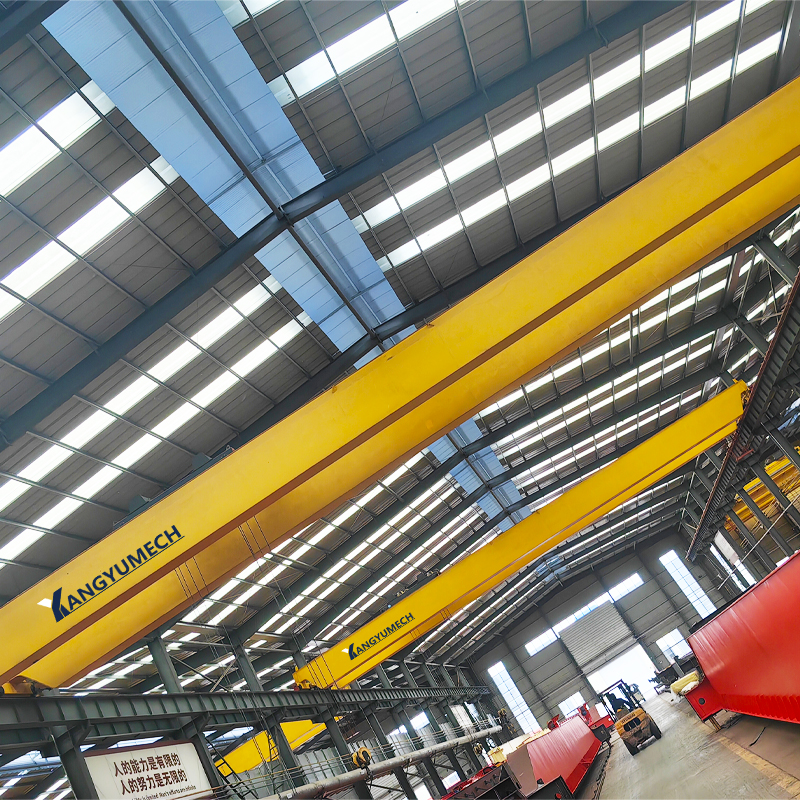In the highly competitive global machinery industry, building a world-class brand is no small feat. For Yangyu Cranes, the journey to international recognition likely involved a combination of technological innovation, strategic market expansion, and a strong commitment to quality and reliability. While specific details about Yangyu Cranes are not widely available in public sources, we can draw insights from the strategies of successful Chinese industrial brands that have achieved global prominence. This article explores the key factors that potentially contributed to Yangyu Cranes’ rise as a renowned brand in the overhead crane industry.

At the core of any successful heavy machinery brand is a commitment to technological advancement and product quality. For a crane manufacturer like Yangyu, this might have included:
Developing High-Capacity, Efficient Cranes: Offering a range of products with varying load capacities (e.g., from 5 tons to 500 tons) and spans (e.g., 12-30 meters or more) to meet diverse industrial needs.
Incorporating Smart Technology: Integrating IoT sensors, automation, and remote monitoring systems to enable predictive maintenance, enhance safety, and improve operational efficiency.
Focusing on Durability and Safety: Designing cranes that withstand harsh environments (e.g., temperatures from -20°C to +40°C) and adhere to international safety standards (e.g., CE and ISO certifications).
🔍 Innovation in technology ensures that products not only meet but exceed market expectations, a trait seen in many successful industrial brands. 1
Expanding beyond domestic markets is crucial for global recognition. Yangyu Cranes might have adopted a phased approach to internationalization:
Targeting Key Regions: Initially focusing on emerging markets in Southeast Asia, Latin America, and Africa, where infrastructure development drives demand for lifting equipment.
Entering Mature Markets: Gradually penetrating developed markets like Europe and North America by meeting stringent quality and certification requirements.
Localizing Operations: Establishing local offices, partnerships, and service centers to provide faster response times and better customer support, similar to strategies used by other global industrial firms10.
🌍 Global expansion requires understanding local market dynamics and building a presence in strategic regions. 1
Building a strong brand reputation involves more than just selling products; it requires trust and reliability.
Dual-Brand Strategy: Like some successful Chinese companies (e.g., Yangjie Technology’s use of “MCC” in欧美 markets and “YJ” in Asia)4, Yangyu might have used a similar approach to cater to different regional preferences.
Focus on Large Enterprises: Targeting large industrial clients for high-value contracts, which can lead to referrals and repeat business.
Emphasizing After-Sales Service: Providing comprehensive support, including installation, training, and maintenance, to ensure long-term customer satisfaction.
🤝 A customer-centric approach and strong brand identity are key to retaining clients and entering new markets. 2
Adhering to international standards is non-negotiable for global acceptance.
Certifications and Testing: Ensuring cranes meet global standards (e.g., ISO, CE) and undergoing rigorous testing for reliability and safety.
Supply Chain Management: Sourcing high-quality materials and components from certified suppliers to maintain product integrity.
Environmental Considerations: Developing energy-efficient cranes and eco-friendly manufacturing processes to appeal to sustainability-conscious markets.
✅ Quality and compliance are foundational to building trust in international markets.
Staying ahead of industry trends helps in remaining competitive.
Renewable Energy Sector: Providing cranes for wind farm installations and other renewable energy projects, similar to how some companies have expanded into this growing market1.
Infrastructure Development: Capitalizing on global infrastructure initiatives (e.g., hydropower projects, logistics hubs) that require heavy lifting equipment.
Digital Transformation: Offering digital solutions like IoT-based monitoring and automation to align with Industry 4.0 trends.
📈 Adapting to sectoral shifts and technological trends ensures long-term relevance and growth.
Collaborations and financial stability can accelerate growth.
Partnerships with Global Firms: Working with international distributors or strategic partners to expand market reach.
Financial Investments: Utilizing funding for R&D, capacity expansion, and market development, possibly through public listings or strategic investors.
💡 Partnerships and financial health enable scaling operations and innovating continuously.
While the exact path to success for Yangyu Cranes isn’t detailed in public sources, the strategies outlined above—rooted in innovation, globalization, brand building, quality, and adaptability—are common among industrial brands that have achieved worldwide recognition. By focusing on these areas, Yangyu Cranes could have built a reputation for reliability and excellence in the global overhead crane market.
For businesses looking to emulate this success, prioritize technological innovation, understand your target markets, and never compromise on quality and customer service.